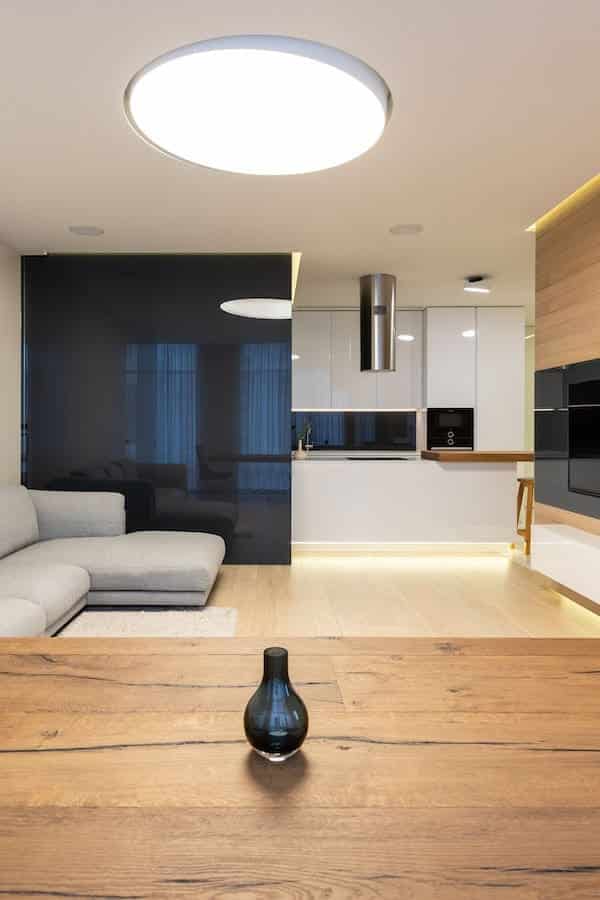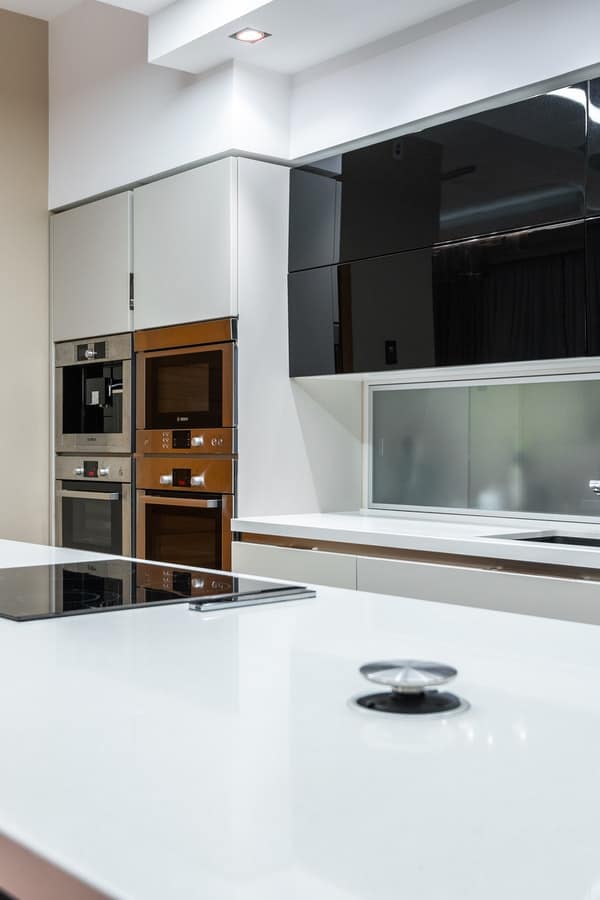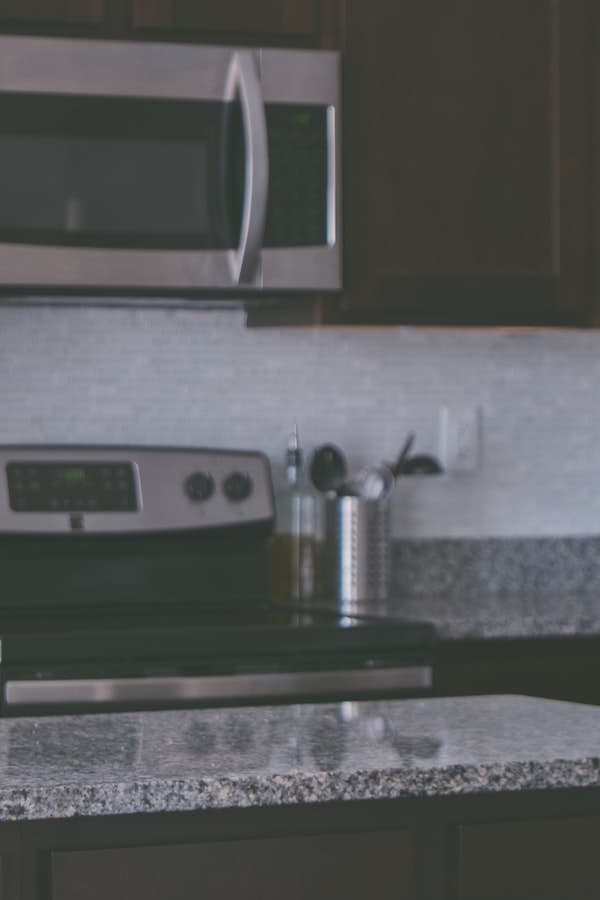Rust might look cool on antiques, but in your home and on your countertops, not so much. It’s also not food safe, so if your kitchen worksurface is starting to develop rust, it needs to be dealt with pronto.
Tackling rust can be a challenge depending on its severity. It won’t disappear with a little antibacterial spray and a wipe, you need the right products and know-how on what to do.
So you’ve come to the right place.
Luckily, the products used to tackle rust can be found in your kitchen, saving you a trip to the store! Keep reading to figure out which method could work for your countertop.
- How to Get Rust off Laminate Countertops
- How to Remove Stains from Formica Countertops
- How to Remove Rust Stains from Quartz Countertop
- How to Prevent Rust From Forming on Quartz Countertop
- Avoid leaving iron or steel objects on top
- Avoid leaving wet rags or sponges on your countertops
- Clean spillage from your tap water
- How to Remove Rust from Granite Countertops
- Can I use bleach to remove rust from my worktops?
- How do I remove rust from my bathroom countertop?
- To Summarize
There may be affiliate links in this article. You can read more about this in my disclosure.
How to Get Rust off Laminate Countertops

Laminate is the most common material used for countertops. It’s relatively cheap and super stain-resistant.
However, in certain situations, it can rust. There are a few home remedies you can use to tackle rust on your laminate countertops.
White Vinegar
Vinegar is high in acetic acid, which is powerful enough to dissolve rust. It’s a cheap, effective method that just takes a couple of hours.
Here’s what you need to do:
- Mix some salt into a bowl of white vinegar.
- Spread the mixture over the stain.
- Leave to absorb for an hour or two.
- Check on it every so often, making sure the paste is kept moist by spraying or pouring a little vinegar over it.
- Wipe away the paste with a damp cloth.
- Repeat the process if necessary.
The rust should largely be gone, but if rust spots remain, you can follow up with a little baking soda. Simply sprinkle some baking soda over the rust, and rub with a damp sponge.
The abrasive action should clear up any leftover rust and leave your countertop looking fresh!
Baking Soda
Baking soda is highly alkaline, which is the total opposite of vinegar. Therefore, it can attack the rust in a very different way.
So if vinegar didn’t work for you, this might.
How to use baking soda to remove rust from laminate countertops:
- Put a few tablespoons of baking soda into a bowl.
- Gradually add water, stirring as you go, until a paste is formed.
- Spread the paste over the rusted area.
- Let sit for at least an hour.
- Wipe away the paste with a damp sponge or cloth.
- Repeat these steps if the rust remains or try another method.
If this method didn’t quite cut the mustard, you can add some salt to the paste. Oddly, salt is great at creating rust on metal, but when salt is added to non-metallic surfaces, it can break down the rust.
Mix some salt into baking soda and water, rub it onto the rust and watch the magic happen.
Cream of Tartar
Cream of tartar is another elusive product you probably bought once for a certain recipe and never used again. But we’ve found another use for this odd product, cleaning!
Cream of tartar is super effective at quickly removing rust spots from countertops with a few simple steps:
- Add a few tablespoons of cream of tartar to a bowl.
- Gradually add the water until a thick paste is formed.
- Using a damp cloth, wipe the paste onto the rust.
- Leave it for around 10 minutes.
- Wipe away with warm water.
How to Remove Stains from Formica Countertops
Formica is a type of plastic laminate and acts in the same way.
Sometimes rust stains can be removed from formica with a little dish soap and a cloth, but you’ll likely need to work at it a little more. You can use the same methods of rust removal as stated in treating laminate.
How to Remove Rust Stains from Quartz Countertop
Quartz may appear impenetrable and stain-proof, but sadly this isn’t the case. Quartz is vulnerable to damage and rust, and as such, you need to be careful about what products you use.
You don’t want to cause one stain in process of removing another, it’s definitely not the ‘groundhog day’ moment you’re looking for.
Oxalic Acid
- Soak a cloth with Oxalic Acid.
- Place the cloth over the rusty patch and let sit for a minimum of 10 minutes and a maximum of 30.
- Remove the cloth, and wipe down the surface with soap and water.
- Repeat if necessary.
Magic Eraser
I know what you’re thinking, this sounds ridiculous.
But many of us have magic erasers hidden in a drawer somewhere, and this is a good excuse to give it a run for its money. Magic Erasers are made from melamine, which is great at lifting away tough stains.
[amazon box=”B07MF3DY3C” template=”vertical”]Instructions:
- Dampen the Magic Eraser with some water, wringing out any excess water.
- Rub the rust with the eraser in a circular motion. Be patient with this step.
- Continue working the stain, re-wetting the eraser every so often.
- Wipe the area with a damp cloth, removing any residue.
- Dry with a towel and enjoy your sparkling new countertop!
How to Prevent Rust From Forming on Quartz Countertop
It can be confusing when rust appears anywhere inside your home, especially on your gorgeous, expensive quartz countertop. Replacing your kitchen surfaces is costly, so preserving and taking care of them is crucial.
Here are some of the common causes of rust formation on countertops and how to fix them:

Avoid leaving iron or steel objects on top
After a while, it’s likely these objects will come into contact with traces of water, and they will start to rust. Simply put iron or steel items in cupboards or place protective pads underneath them so they do not come into direct contact with the work surface.
Avoid leaving wet rags or sponges on your countertops
This can encourage rusting over time. So make sure to have a designated container for your cleaning rags near the sink.
Clean spillage from your tap water
The water from your tap can cause rust if it is hard water. This is due to its high content of minerals, such as iron.
If this is the case for your household, try to be more mindful about water spillage in your kitchen, and be proactive about cleaning up the water as soon as you can.
How to Remove Rust from Granite Countertops

If your countertop is in good condition, and you’ve regularly sealed it, removing rust can be a breeze. If not, you can use the same methods, you may just need to be patient.
Investing in a commercial stone cleaner is a good idea, it will prolong the life of your surfaces and keep them looking fresh.
Follow these simple steps:
- Consult the manufacturer’s instructions and apply the cleaner to the rust.
- Using a nylon brush or a scrubbing pad, work away at the stain in a circular motion. Make sure not to use steel or anything too abrasive that could scratch the surface.
- Wipe away the cleanser with a damp cloth.
- Repeat these steps if necessary.
To prevent rust from forming in the future, make sure to seal your granite on a more regular basis.
Can I use bleach to remove rust from my worktops?
Bleach can indeed remove rust, it’s a powerful cleaner that can be used in most cleaning dilemmas.
However, bleach leaves stains, and may worsen the appearance of your counter, especially if it’s laminate.
[amazon box=”B07J6FJR8D” template=”vertical”]How do I remove rust from my bathroom countertop?
Bathrooms are high-traffic areas, and water is constantly everywhere. Unless you wipe down the counter every time you use it, rust is likely to form at some point.
You need to identify the material of your vanity first, before choosing your cleaning method. Many are made of laminate or quartz, so use the methods described above.
If your bathroom counter is tiled, follow these steps to remove rust marks:
- Liberally squeeze lemon juice over the rusted areas and allow to sit for 5-10 minutes.
- Scrub the stain with an abrasive sponge or old toothbrush.
- If the rust persists, sprinkle some salt over the area and leave it for 3-4 hours.
- Scrub the area again.
- Wipe clean with a damp cloth.
To Summarize
If rust has formed on your countertop, whether in the kitchen or bathroom, it’s difficult to ignore. And you shouldn’t.
Tackling rust before it spreads further and embeds in your surface is imperative. Leaving rust to grow in your kitchen is potentially harmful as it’s not food safe, so don’t let the rust get too comfy!
Using the simple methods above should be effective at removing any rust from your countertops, and show you how to care for your surface to prevent any future rusting.



